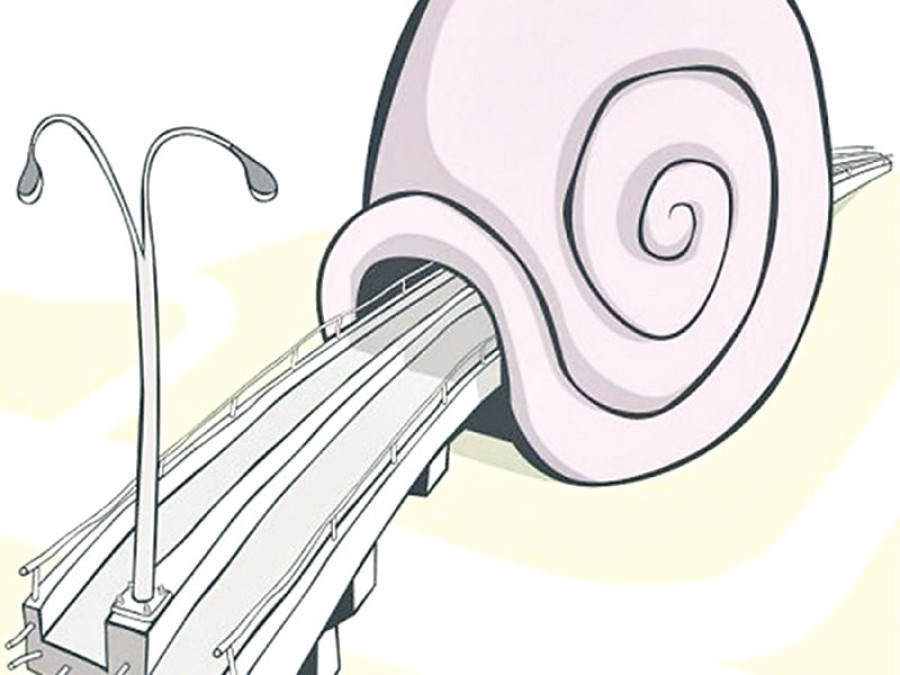Opinion
Country roads
The forever unfinished Postal Highway illustrates the low priority accorded to Madhes so far
Randhir Chaudhary
Along with disagreements over certain provisions in the constitution, development issues are being raised, which is a good sign for the country. Last month, Ram Kumar Sharma of Naya Shakti Nepal and three other protestors broke their fast unto death after the Nepal government promised to widen the Janakpur-Bhithamod road to six lanes. Similarly, youth leaders of Madhesi parties are planning to fix a deadline for the completion of the venerable Postal Highway. In the 1990s, the then Indian prime minister Chandra Shekhar had pledged that India would build the road to speed up Nepal’s development. This kind of pledge has been repeated during every visit from either side.
After the People’s Movement in 2006, India had agreed to design, supervise and construct 1,440 km of roads including the Postal Highway and other routes in the Tarai. Subsequently, an Indian company was contracted to implement the project. The contractor abandoned the project after a short while complaining that the Nepal government had been uncooperative in cutting down trees on the proposed route, uprooting electrical polls, providing land and supplying construction materials. This points to negligence on the part of the Nepal government to build the Postal Highway and other roads in Madhes. Last February, when the then prime minister KP Sharma Oli visited India, the two countries had forged an agreement that Nepal would build the Postal Highway but India would provide counselors and evaluators.
A bit of history
Whenever the question why the Tarai is not developing is asked, people usually say that the reason is lack of roads. The Postal Highway, which extends along the length of the country, has been in operation for years. In the 1960s, king Mahendra decided to construct the East-West Highway, which is located 20-30 km northward of Madhesi settlements. The highway was given high priority and it was built by clearing the jungle. As a result, the Postal Highway receded into the background and remained in a dilapidated state. The completion of the Postal Highway can change the developmental map of the Tarai, which will benefit the entire country in the long term.
After the construction of the East-West Highway, the ancient towns in Madhes gradually lost their shine and importance. For instance, traffic on the Sarlahi-Malangwa and Jaleshwar-Mahottari routes has been shrinking by the day. Newly emerging market towns along the East-West Highway are booming while the old markets are declining rapidly. In order to find out the stand of the political parties on the Postal Highway, this scribe had talked to Federal Socialist Forum Nepal’s Abhishek Pratap Shah, a Member of Parliament representing Kapilvastu. This was when Naya Shakti central committee member Ram Kumar Sharma was on a fast onto death. Shah said, “A level of discussion is going on among Madhesi parties to raise the issue of development in general and the Postal Highway in particular.”
As everybody knows, roads are the backbone of any country for its swift development. In Nepal, it is accepted by all that the Tarai is the country’s breadbasket, not only in the sense that it has more productive soil, but also in terms of good connectivity with India, which is our largest trading partner. Moreover, common Madhesis have been complaining that the health of locals has been affected and the rate of road accidents has increased due to sections of the highway being left unfinished.
Reducing Madhesi anger
Once again, during the recent visit of Prime Minister Pushpa Kamal Dahal to New Delhi, the two prime ministers noted the successful completion of two roads totalling about 71km in length under Phase 1 of the
Tarai Road Project. The two
heads of government directed officials to expedite the construction of the Postal Highway and feeder roads and complete
them as soon as possible, in accordance with the modalities for implementation agreed by the two sides last February.
In this context, all development activists of Nepal should be proactively playing the role of a watchdog to ensure that the promises made by all the parties concerned over the Postal Highway are fulfilled. Lawmakers representing Tarai constituencies should be committed to completing the road. If the Postal Highway is delayed this time too, it may fuel the fire in agitated Madhes. After the Postal Highway is completed, not only the Madhes but the entire country will be able to see its development graph rising. Most importantly, the anger of the Madhesis against Kathmandu will also be reduced to some extent.
Chaudhary holds a Bachelor of Law degree




 14.12°C Kathmandu
14.12°C Kathmandu










